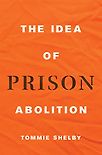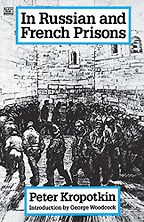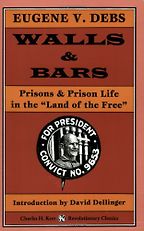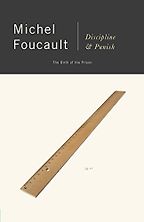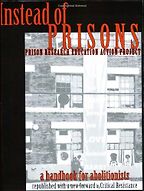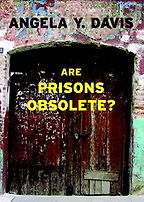Could you just begin by sketching the difference between the prison abolition movement and the prison reform movement, because sometimes they get confused in people’s minds.
Prison abolition is a broad movement currently, and lots of different political philosophies run under that banner. For example, some people think of themselves as abolitionists, even though they don’t take a very strong anti-prison stance. I think of abolition as encompassing two main claims.
There’s the claim that imprisonment is an immoral and ineffective way to respond to harmful wrongdoing and a call to do away with the practice on those grounds.
There is a second claim, often though not always, included in abolitionist thinking: that when we consider our most fundamental political aims, these should not include reforming prisons, which on abolitionists’ views is not going to succeed anyway and, even worse, is going to legitimize the practice of imprisonment. So rather, our most fundamental aim should be to transform the broader society so that prisons are not necessary, or not even thought to be necessary.
So those are the central pieces of a prison abolitionist outlook as I understand it: prisons are harmful and don’t work and we should, at least eventually, get rid of them completely, which will require fundamental structural transformation. There are people who might step back from parts of this, or make various qualifications, but I think it fairly captures the view.
By using the word ‘abolition’ it is very clearly linking itself with the abolition of slavery and there are, in the eyes of some theorists, direct links between attitudes to enslaved people and attitudes particularly to black prisoners in the US prison system. So my take on what you were saying is that the abolition movement treats reform as a kind of immoral action in itself, because it supports a fundamentally inhumane system which is akin to slavery, which incarcerates people disproportionately from a particular section of society. The underlying causes of crime are largely ignored by the political system and prison is, as it were, just treating the symptoms and as a result punishing individuals cruelly and often in a racist way.
That’s right. I think that the abolitionists, certainly the ones I’m most engaged with, who’ve been writing mostly around the last 50 or 60 years, would raise these objections against prisons. When they say it’s immoral, they give lots of different grounds to back this up. One of these is that imprisonment is akin to slavery or connected to slavery in a way that makes it highly objectionable. That’s a very old criticism, as it turns out, and we can return to that in a moment when we talk about some earlier contributors to this debate.
“Philosophers are especially suited to take up…ideas that break with common sense and received wisdom”
Amongst people in the US black radical tradition, the slavery criticism takes a distinctive form. On the one hand, you could see the objection linking prison and slavery as connected to strands of Marxism — the thought that what you have is a series of systems of exploitation and domination (slavery, serfdom, wage labour) and all of them have a similar structure, one they share with imprisonment. But in the hands of many black radical thinkers, this idea has a different cast, because as you mentioned, it’s also connected to the domination of people of African descent under modern slavery and colonialism and to the ways the black world gets incorporated into the broader Western world and the global capitalist system. And so a lot of the objections to prison are contained within the idea that it’s often a form of or tied to some form of involuntary servitude, and/or is an instrument to maintain such systems of exploitation and in particular, in a way that marks people of African descent as inherently criminal and thus in need of institutional control.
You’ve recently written The Idea of Prison Abolition, very much from a philosophical point of view. You come across as both sympathetic to many aspects of that tradition, but also are willing to engage critically with it: your book is in the dialogue with the movement and provides internal criticism of it.
Yes, that’s the approach. I think philosophers are especially suited to take up radical ideas, ideas that break with common sense and received wisdom. In that way, prison abolition is ripe for philosophical analysis. It’s not widely accepted, and most people think it’s an absurd view. But I think it’s one that’s worth taking seriously. What I’ve tried to do in the book isn’t to attempt to make the case against prison abolition. My intention is, rather, to try to learn from abolitionist thought and practice, even as I, in the end, think some kind of reform, quite radical reform, is the appropriate response to our condition.
I wanted to think through the abolition position, think through its principal objections, through the arguments abolitionists present, and see their force. I do think there’s a lot of power in some of them. But I think there are some weaknesses, too. And I don’t shrink from highlighting those where it seems appropriate. Because in general, my attitude is, as a philosopher, you’re taking up these questions from a first-person point of view, you’re trying to figure out ‘What should I think about this question?’ That’s the attitude I take. My question is ‘Should I be a prison abolitionist?’ I’ve written previously in Dark Ghettos in defense of a radical reform position, and people who regard themselves as to my left, as more radical, have challenged me to take up a more radical position. And the question is, is that the right thing to do? The Idea of Prison Abolition is my answer.
Brilliant. Thank you. So let’s move to your five book choices. What you’ve done in these choices is show the longer history of this movement. The prison abolition movement might seem like a recent development, partly because there have been some vocal exponents of that approach recently, particularly connected to the movement in favour of defunding the police as a reaction to crimes by police officers. This has certainly given it impetus. But this movement has a long history. Let’s go to your first choice. What is that?
My first choice is Peter Kropotkin’s In Russian and French Prisons, published in 1887. This could be regarded as the first book-length defense of prison abolition, though no doubt there’s some out there I’ve missed. Kropotkin was a revolutionary and an anarchist theoretician. One reason I chose this book was to highlight the anarchist strand of abolitionist thought, which opposes all forms of government. Also with Kropotkin, this is a person who spent two years in a Russian prison, and three years in a French prison. He’s drawing on that experience in addition to his broader theoretical point of view as a communist and a person who supports decentralized communities.
Correct me if I’m wrong, but it seems to me that in that work, or certainly in his writing, Kropotkin does at least two things which are central to the abolition movement. First, he makes the case for people who were considered dangerous or dangerous to society in various ways, being dealt with by the community, rather than shut away from the community. Secondly, he believes that a small, closely-knit community has the wherewithal to rehabilitate such people.
This is a good point you raise here. He is a kind of communist, one that favors fairly small communities of workers sharing the work and sharing the product of that work in an equitable way, consciously attending to each other’s needs. It’s not a community of strangers. It’s not mass society. So it’s a particular way of thinking about what it means for us to live with one another in a way that’s just and humane. Obviously, if you expand out to the kind of societies we now mostly occupy, which are large, multimillion and multiethnic political communities, they don’t really have that kind of structure. And you can see why prison might arise as a way to respond to this circumstance.
Kropotkin also has—most abolitionists do—a theory of crime. He thinks crime is partly a matter of environmental factors or climate factors, and it’s partly a matter of untreated illness, both physical and mental, that needs to be attended to. But probably most important in terms of his critique of prisons, he believes that the big cause is the way society itself is organized. Having a mass capitalist society is very impersonal and anomic. It’s not surprising that you’re going to have these kinds of problems and then develop this instrument, the prison system, to deal with it.
Unless you had a theory of ‘demon seed’ passed down through generations, where else is crime going to come from? Our environment must be hugely, hugely important. Obviously, there are genetic factors too, but environmental ones are key, including the factor of whether there is easy crime available to people to tempt them into it.
I think that’s right. What I find most interesting about this book is the way he talks about what the prison does to people. He thinks of the prison as an instrument that deforms the will of prisoners, making them less able to resist temptation and antisocial impulses. That’s partly because of the authority that prison officials have over people and the way they abuse that power over those in their care. But it also has to do with the way prisoners live in the environment of the prison, where they don’t have opportunities to practice resistance to the temptations of social life, to learn how to develop their sense of autonomy as rational agents, to hold those baser impulses in check. Kropotkin believes the structure of prison actually makes people worse, and I think that’s an interesting line of argument.
And it’s one that’s been empirically confirmed in terms of recidivism — the opposite of what Jeremy Bentham hoped for in the early 19th century with his panopticon, a “machine for grinding rogues honest.” Bentham’s prison regime was a pretty grim way of achieving that, but the aim was that people should emerge changed, different from how they went in, better people from society’s point of view rather than worse. The exact opposite is what most prisons seem to achieve.
Yes, that’s his position.
Let’s move on to your second choice. This is a much later book, published in 1927: Eugene Victor Debs, Walls and Bars: Prisons and Prison Life in the Land of the Free. Could you tell me a bit about Debs. I don’t think he’s as widely known a figure as Kropotkin.
Born in Indiana, Debs was a socialist and labor organizer, a radical but also a politician. He ran for public office many times, including for President of the United States on the Socialist Party ticket. He also spent time in prison. One of the things you get in a lot of prison abolitionist writings, and certainly in Walls and Bars, is an emphasis on how often imprisonment is used as a method of political repression. It’s a way for those in power to neutralize popular leaders who dissent or are resisting the way society is currently organized. As a radical labor organizer, Debs was often strongly at odds with those in power and found himself in prison as a result. He was a very influential figure in the broadly American socialist tradition, though if you read this book you’ll hear familiar notes from Marx and earlier British socialists, as well.
Does he advocate abolition in the modern sense?
He does. Interestingly, he thinks that in a more humane society, a socialist society, there wouldn’t be prisons, and that’s the kind of society we should be trying to bring about. He does, however, have a lot to say about how, in the meantime, the internal life of prisons should be reorganized. He imagines a very different way of structuring them, where prisoners have much more self-determination, much more control over what’s happening inside, and participate in the running of the prison.
The central thesis of the book is something like this: capitalism causes poverty, which causes crime, and the prison system then becomes necessary to protect capitalist control over productive assets and the conditions of work. So that’s largely what he’s trying to establish. Something that runs throughout the book is the thought that what we’ve got is a system that creates people who are impoverished and desperate and who live in precarious communities, strained in ways that lead them to resort to criminal conduct, either to meet their various needs or sometimes because they’re angry and resentful about their conditions. They find themselves in prison, many worse off as a result, and then they’re let out with little in the way of rehabilitation, and just return to the same thing. And so the cycle in and out of prison is perpetuated. It’s not surprising, then, that you have these high recidivism rates.
It seems to me that so far, in the books we’ve discussed, there is a tendency for abolitionists to come to abolitionism via Marx. But perhaps you could be an abolitionist entirely independently of Marxist economic theory. You don’t have to buy the Marxist picture of the proletariat or anything like that, or the ways in which ideologies work: you could simply believe that the best solution to crime is not through prison, but through some kind of treatment in the community together with reforming society so that crime is much less common. But historically, abolition has been, it seems to me, closely tied to Marxism.
It often is. I agree with you it doesn’t have to be. One could simply emphasize the nature of prison conditions, how they are dehumanizing, how incarceration makes people worse, how it invites people to abuse their power, how it’s not effective at preventing crime, and so on. One could insist on these points without any commitment to Marxist philosophy. I think that anybody who wants to make the case for abolition and be persuasive to people who are going to be immediately very skeptical, you’re going to need to justify your position to them with some kind of theory of crime. You need an account of why people are behaving in these ways. We know that people sometimes do terrible things. Why are they doing them? Why should we think we could create conditions where they wouldn’t behave in those ways, or do so only very rarely? Marxism and the broader socialist tradition give you one sort of answer. Not the only answer, but one answer to that question, which is that we have a system of exploitation that impoverishes the people who create the wealth that the wealthy then get all the benefits from. And these same beneficiaries are largely able to avoid the prison system: when they do commit crimes, at times horrific crimes which harm many more people, they are able to buy their way out of the system with lawyers, and so effectively avoid having to serve time. So this creates enormous resentment on the part of working-class people. I think this is a very compelling explanation of at least a lot of crime — not all crime, but a lot of crime.
Marxism has a kind of utopianism, a dream of an imagined future where we’ll be brothers and sisters acting together, not strangers and enemies, and when we will unite (or at least, workers will unite) and overthrow the powers suppressing us. On that view, there’ll be a revolution, a complete revolution, not a gradual, incremental change.
I think that abolitionists, many of them at least, would these days say, ‘Look, this is a long-term project’. They’re not really imagining an abrupt break from the global capitalist system, but something that we will work at over time. They might even imagine that we’ll do this by prefiguring the form of life that we want to bring about in smaller-scale communities, a proof of concept, in a way: ‘Let me show you that you can live in ways without such heavy reliance on policing and prisons and surveillance. And yet, it would be peaceful.’ That’s the kind of thing you might scale up and convince others to reorganize society on the basis of this success. Prison abolition needn’t be revolutionary, though it often does have that orientation.
If I’ve got it right, it’s a strong reaction against retributivism. Prison abolitionists take it as a given that the purpose of any kind of prison-type system or treatment of criminals is to produce a better society, not to be a form of legalised revenge on the people who have committed crimes. Sadly, that’s not a widely shared view in the broader world outside philosophical circles – there retributivism dominates.
That’s absolutely right. It’s probably one of the reasons why a lot of abolitionists think of abolition as a long-term project, because in addition to fighting against an ethos of competition and domination which you might associate with capitalism, as we know it, you also have to fight against an ethos of retribution and retaliation and ramping up of punishments in response to people’s harmful wrongdoing. That takes work too, to get people to relinquish that way of responding. It’s natural to respond in that way: it’s a familiar human disposition to be angry and resentful and to want to strike back against those who do wrong, including those who harm our communities. But we must work through that—as we do with many other impulses that are anti-social or destructive—to a different way of thinking about human wrongdoing and the harm it does. We need to respond in a way that’s not only more effective, but also just more humane, in a way that understands human frailty, in a way that understands the environmental conditions that lead people to behave in these ways. We need to create the conditions for reconciliation between those who do wrong and those who are harmed or survive that wrongdoing. So prison abolition will inevitably involve an attack on the retributive framework.
Your third book choice is Michel Foucault’s Discipline and Punish: The Birth of the Prison. This is an incredibly important book in the history of thinking about prisons in that it looks at the way people thought about punishment over time and how that’s changed. Do you want to say something about why you chose this book?
Yes, Discipline and Punish is more theoretical and abstract than a lot of abolitionist writing, and Foucault is of course not just attacking the prison system, but other social systems of domination and control that he thinks are attendant to it. He has large ambitions here in critiquing a central feature of modern social life, one that some people now call the carceral system or carceral ways of responding to others and controlling others.
Could you gloss ‘the carceral system’ for us because I’m always a bit disconcerted when people use that phrase? If they just mean a prison system, why don’t they just say that? ‘Carceral system’ seems to have different connotations.
The way I think of it is that incarceration is the broad category of institutional confinement. We’re not talking about just locking people up in buildings; we’re talking about an institution that’s hierarchically structured, with strict rules of order, and uses surveillance and control of people’s movements and communication inside and outside the carceral facility. A carceral facility can be used for a variety of purposes. Sometimes it’s used to punish. But other times, it’s at least ostensibly being used for psychiatric treatment, or for rehabilitation, or for detention. Sometimes it’s used in the context of war, when trying to deal with prisoners of war, sometimes for a quarantine, when there’s a serious threat to public health.
“Anybody who wants to be an abolitionist now must make gun control part of their position”
You’ve got this broader system of confinement that’s a highly structured, hierarchical system with a lot of surveillance. This has the effect, so Foucault says, of not only directing and restricting the movements of those inside, but it can also restructure their souls, making them more docile, easier to control, more inclined to submit to authority, and the like. When he’s talking about a carceral system, I think he’s talking about that broader practice, though when I—and many others—talk about prison, we’re talking about a carceral system when it’s being used to punish, incapacitate, or rehabilitate those who are responsible for committing crimes.
Foucault describes the important historical moment where punishment went private, as it were, in the sense of taking place out of sight of the public, the move from torturing somebody on a scaffold for trying to kill a king, to locking them away in solitary confinement for a year or two, and keeping them out of sight of the public. That’s a very different, perhaps almost equally cruel and inhumane way of treating people: it’s a kind of psychological torture, as opposed to the more obvious, physical torture where people are losing limbs and having their guts disemboweled.
Both are deeply cruel. One is more brutal and more of a spectacle, a public spectacle; whereas the other is seemingly clinical and humane, though it functions similarly and does its damage less on the body and more on the mind. It’s cruel in a different way.
Let’s move on to your fourth choice. This is Instead of Prisons: A Handbook for Abolitionists by multiple authors and published in 1976. This sounds like a resource book.
Yes, this is a collaborative project, one that’s pretty comprehensive in scope, I think, in terms of the issues that it takes up, and it’s meant as a practical organizing tool. One of the central figures here is Fay Honey Knopp, though there are a bunch of other people who were involved in the research and writing, including Scott Christianson and others. You can clearly see her influence as someone who’s coming out of the Quaker tradition – she has a broadly pacifist orientation. Again, I chose it in part to highlight a different strand of abolitionist thought, just as I’ve highlighted the anarchist tradition or the socialist tradition or the post-structuralist tradition. Here you have a figure who is a Christian pacifist and also a feminist, and I think that’s important to emphasize. The people working with her also have a strongly feminist orientation.
I really like the book. It takes up a lot of the things that would occur to people when prison abolition is advocated and tries to respond to many of those objections. It also includes a strong critique of retributivism, as we discussed. It is staunchly opposed to the use of violence, including state violence. I think that’s important here too. It’s against the military, the police, and by extension, the prisons and prison guards as a way of responding to wrongdoing or injustice. We won’t solve these issues with violence, even if it’s state-sanctioned, is the thought.
One of the main things I like about the book, and this is probably its most distinctive feature, is it’s a really in-depth discussion of how to prevent and respond to violence against women and children. That’s one of the best parts of the book — it comes toward the end. There’s a focus on reeducation, especially about patriarchy and how it works. It emphasizes treatment rather than punishment. There’s a lot of discussion about the range of ways that we ought to empower women generally and survivors of gender-based violence in particular. That includes self-defense training, rape crisis response, domestic abuse centers that are very well-funded and well-run. Such prevention is going to involve getting people to change their attitudes about women and gender roles, rethinking that.
There’s an emphasis here on a restorative justice approach to being harmed, providing a way of reconciling people — the wrongdoer and those they’ve wronged. I like the way it articulates a vision of supporting women and building women’s organizations with a feminist outlook as central to an abolitionist movement. It’s one of the earliest books I’ve seen that articulates that point of view within an abolitionist framework — though there are several more recent books that do something similar.
That’s a very persuasive pitch for reading the book. I’m very sympathetic to the idea of empowering people to make change to society. But there’s still the issue that we haven’t really discussed, that with some kinds of crime, there is a real risk to individuals when the perpetrators, who are known to be violent are at large in a society. A lot of murderers only murder one person in a lifetime, their spouse, but other murderers don’t. And with serial killers, it’s very hard to see how the subtle reorganization of society will protect against potentially very damaging and damaged people. That’s a sticking point for many people with abolitionism, that it doesn’t have a story about what you do with people like that. You can say we want to reform prisons, and have far fewer people there. But with violent criminals who are known to be extremely dangerous and likely to repeat those kinds of crimes or escalate them, there is a real issue.
That’s right. And some abolitionists, I think, would concede it. They often don’t give elaborate responses to this objection, though. I think that’s a problem. But I do think the basic lines of response are fairly straightforward. With the re-organization of society to make it more just and a change in how we approach harmful wrongdoing, we’re going to find that the problem of the murderer or rapist or serial killer will only affect a really small number of people, certainly too few to possibly justify the large carceral system you find in a place like the United States where on any given day there are almost 2 million people confined.
I have to say that that is as strange to us in the UK as the gun laws in the US are. This is one of the slightly alien aspects of the US from our perspective—not that we don’t have a terrible prison system in some ways ourselves—but the scale of incarceration in the US is just almost unbelievable.
Yes, I can see why. Probably what abolitionists would say is, ‘We do need some forms of restraint for people who we know to be really dangerous.’ I think they’re skeptical of a lot of people’s claims about who’s truly dangerous and who isn’t but they recognize that sometimes there are people within society who are genuinely dangerous. There’s going to be a question of how many of those people are going to fall into the category of people with debilitating mental illness and so who really need to be responded to in a medical way, and maybe placed in a psychiatric hospital rather than a prison, and how many people are simply morally depraved but not mentally damaged such that they don’t have proper moral autonomy.
Abolitionists generally think that very few people are in that latter category, or at least would be in that category in a just society. They might also emphasize that we’re already living with people who are disposed to extreme forms of violence. No system of criminal justice catches and confines everybody who commits violent crimes. It’s not as if civilization falls if there happen to be people among us who are doing serious wrong.
I guess my response to that would be that a very small number of individuals who are malevolent and have access to automatic weapons can cause huge amounts of damage if left roaming at large. There’s no simple solution to that. We can change society, and hopefully, there will be fewer such people, but the causes of those sorts of psyches are complex, and we don’t really know how to eliminate their possibility. A very small number of malevolent actors can be destructive to all kinds of things that we value, not just human life, but property, institutions and much more.
Agreed. Anybody who wants to be an abolitionist now must make gun control part of their position.
So let’s turn to your last book, by Angela Davis, Are Prisons Obsolete? Her answer is yes.
Or at least they should be made to be, yes.
She’s an incredibly important thinker for you. Could you give us a sense of why she’s so important?
It’s partly for the reasons I’ve already mentioned. There are several abolitionist traditions. Davis presents abolition in the form that I find most compelling and makes me feel that I really do need to respond to the challenges this movement has presented. And that’s because she is situated within both the feminist tradition and the black radical tradition, and while her political philosophy is informed by Marxism and the Frankfurt School of critical theory, and even Foucault, she’s also drawing on a broader black intellectual tradition closely linked with radical feminist theorizing and practice. I find that synthesis of ideas powerful. I think of myself as in the black radical tradition and have been greatly influenced by Angela Davis’s work. I agree with her about many things, and so, naturally, I felt compelled to engage with her on this question.
“While many existing prisons are deeply unjust, I don’t think that prisons are inherently wrong”
Another aspect of this is that Davis is a philosopher, one of us, and so understands, in a way some abolitionists might not, the kind of thing I’m trying to do in my own book, where I’m thinking through the details of arguments, attempting to systematize ideas within a consistent set of basic principles, asking difficult counterfactual questions, trying to extract more general lessons from particular examples, and the like. The kind of thing philosophers like to do. She totally understands that. This common philosophical background makes her a more appropriate interlocutor than some other abolitionist thinkers.
She herself, like some others we’ve talked about, has spent time in prison, as a political prisoner. She has been engaged in anti-prison activism for more than 50 years. I think of her as the leading abolitionist thinker in the black radical tradition today. I also feel that her work is too often ignored by philosophers, or not taken seriously enough. It’s important to engage with a figure like Davis, not least because she’s a black woman. How often do you find detailed, in-depth critical engagement with black women philosophers in academic philosophy? It’s rare, unfortunately.
Who was Davis writing for?
Davis is clearly writing for a public audience in a book like Are Our Prisons Obsolete? She writes as a scholar-activist, as an academic, but she’s not writing in a purely academic way. She is trying to raise political consciousness about this issue. And she’s not shying away from being explicit about what her political commitments are. She also draws on modes of argument and inquiry that don’t always have a natural place in academic philosophy, whether that’s memoir, personal experience, or using art, especially experimental art, or drawing heavily on history, to establish a conclusion. Some of these genres of writing are not commonly used in academic philosophy.
She sounds the ideal person to think along with and to some degree against. Philosophers typically don’t go all the way with the people they admire: there is always a moment where they say, ‘Okay, I don’t want to agree to all of that, I don’t accept that step. And here’s why. And here’s my philosophy.’ And it’s fair to say you don’t go all the way with Angela Davis, isn’t it? There’s a point where you don’t accept her conclusions.
That’s right. The most forceful arguments that she presents I would reformulate as arguments for a radical moratorium on the use of prisons in the US. By that I mean the view that we are faced with such grave systemic injustice in our society—as we’ve already discussed, so many of the people who find themselves in prisons are among the most marginalized, disenfranchised, and exploited—that we can’t justify using the prison system to control and confine them, at least not for many crimes. So we should dramatically ramp down — ‘decarcerate’ is the word abolitionists would use. We should really decarcerate, reduce significantly the number of people who are in prison to only the few who are causing great and irreparable harm or deep and lasting trauma. I think that a moratorium is different from a more radical abolitionist position, which would regard the use of prisons as always wrong, whether now or in the future.
I think there’s also a question of whether in a fully just society, imprisonment would be a justifiable practice. Here I’m inclined to think it could be a justified practice, depending on how the prisons are structured and governed and provided due process requirements are followed. And I remain agnostic about whether we would in fact need prisons in a fully just society, whether we could actually make prisons obsolete, because I think it’s difficult to predict how big a problem we would face of serious aggression against others, even under much more egalitarian circumstances.
So while many existing prisons are deeply unjust, I don’t think that prisons are inherently wrong. I believe they can be humane and used in a way that respects people as persons, and that in-prison services should be provided that will allow prisoners to reenter society as equals. We’re far from that ideal in many places. But I think it’s something that we could achieve, and there are some good examples that approach it in other parts of the world, particularly in Scandinavia. But we should also try to restructure our society so that we need prisons much less than we currently seem to need them, and experiment with other practices that are much less harmful to see if we can enhance public safety without resorting to such a severe and troubling practice.
So I’m with Angela Davis on many things, but I don’t endorse the claim that a world without prisons would be the only just one.
Five Books aims to keep its book recommendations and interviews up to date. If you are the interviewee and would like to update your choice of books (or even just what you say about them) please email us at [email protected]
Five Books interviews are expensive to produce. If you've enjoyed this interview, please support us by donating a small amount.

